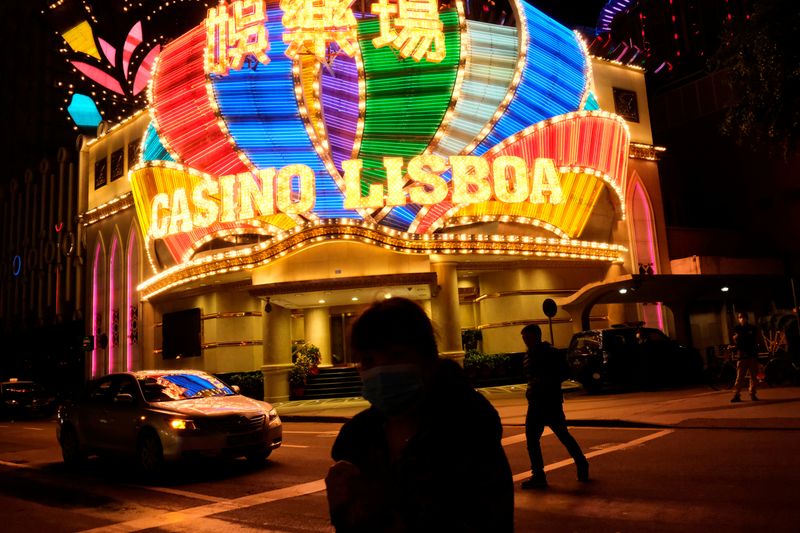This post was originally published on this site
https://i-invdn-com.akamaized.net/trkd-images/LYNXNPEG6N07Z_L.jpg
HONG KONG (Reuters) – Casinos in the world’s biggest gambling hub Macau are staring at heavy losses for the second quarter, with “not much hope” for a near-term recovery as a resurgence in coronavirus cases muddies the outlook for when China will reinstate travel visas.
Visitors from greater China make up for over 90% of Macau’s tourists, but given travel has dried up amid the health crisis, Morgan Stanley (NYSE:MS) warns casinos in the special administrative region could rack up losses of $1 billion over April to June.
The Las Vegas Sands (N:LVS) unit, Sands China (HK:1928), said it flipped into the red with a $549 million loss, setting the stage for a dire quarter for Macau casinos that have been operating with almost no income and no visitors since February.
Even after easing curbs for some travellers, Macau saw only 2,000 visitors per day in July, a tiny fraction of the 108,000 daily average in 2019, as the individual travel scheme through which visitors from the mainland gain entry remains suspended.
“Without the individual visitation scheme being resurrected, there’s not much hope for the casinos to come back,” said Rob Goldstein, president of Las Vegas Sands, which operates properties including the Venetian and Parisian in Macau.
Sands China’s revenue was almost wiped out in the second quarter. Other operators, Melco Resorts (O:MLCO), Wynn Macau (HK:1128), Galaxy Entertainment (HK:0027), MGM China (HK:2282) and SJM Holdings (HK:0880), will report in the coming weeks.
A Reuters calculation shows Macau casino operators came into 2020 with a cumulative cash position of just over $12 billion, providing a solid buffer to survive the coming months.
But anything longer could spell trouble as they continue to bleed millions of dollars in daily operating costs.
Macau has not had a new local coronavirus case for over 100 days, while Hong Kong and some parts of the mainland have seen a sharp spike in infections. Ferry services between Hong Kong and Macau remain halted, further hurting the casino business.
‘NOT GOING TO BE A GOOD YEAR’
Four casino operators have issued or said they plan to issue new debt, worth a total $4.2 billion, in the past two months, highlighting the challenges they face even as they cut costs and streamline operations.
Operational expenses in the second quarter dipped 5% from the prior three months, noted Praveen Choudhary, an analyst at Morgan Stanley, Hong Kong. This could help the industry’s earnings before interest, taxes, depreciation, and amortization break even in the third quarter, he added.
Macau’s gambling industry is crucial for the Chinese-ruled territory where the sector employs about three quarters of its 600,000 population, either directly or indirectly.
The government has mandated casinos to safeguard employment for local staff, prompting operators to find ways other than job cuts to reduce costs such as offering staff unpaid leave.
“There is nothing else we can do at this point,” a senior casino executive said. “We thought it (restrictions) would be done by April, then May, then June, then July. Now this year we say is not going to be a good year,” he added on condition of anonymity as he was not authorized to speak to media.

